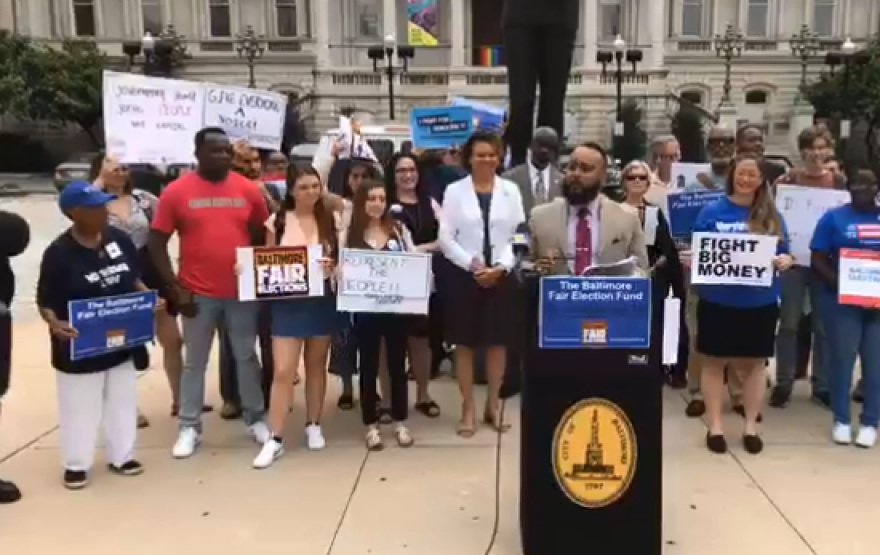The Baltimore City Council approved Monday a bill to establish public campaign financing for candidates running for city offices. The Fair Election Fund would distribute matching funds to candidates who agree not to accept individual donations larger than $150 or donations from corporations, unions and PACS.
The fund’s proponents say it will give candidates who don’t receive hefty checks from corporations a fighting chance as well as boost the impact of donations from Baltimore City constituents.
“We want to make sure that people who run for office have a good shot, and that shot is based on their ability, their message, their vision for Baltimore and not necessarily access to capital,” said Kristerfer Burnett, a Democratic councilman who introduced the legislation.
Burnett pointed to a Demos analysis of Maryland Campaign Reporting Information System data, which found that donors to Baltimore’s 2016 elections did not reflect the city’s racial and economic diversity — most were white men. The analysis also found that the average campaign donation from corporations was more than $1,400, while the average donation from individuals was more than $4,000.
“It shouldn't always necessarily be who you know, but what your message is, to drive campaigns forward,” Burnett said.
The fund will not be available for next year’s elections; it will launch in 2024. Then, candidates must meet certain qualifications in order to receive public campaign financing.
They must agree not to accept donations from individuals larger than $150 or any donations from corporations, unions and PACs. They must also log a certain amount of donations.
For example, mayoral candidates must raise either $40,000 or receive donations from 500 individuals or more to tap into the fund; candidates for comptroller or city council president must raise $15,000 or receive donations from 250 individuals while city council candidates must receive donations from 150 individuals or raise $5,000.
In other words, these candidates “have to have some skin in the game,” Burnett said.
Once candidates meet those requirements and opt into the program, the city will give an influx of cash to each campaign. These “boosts” are separate from matched donations. Eligible mayoral candidates will get $200,000 while those running for comptroller or city council president will get $50,000. City council candidates will not receive boosts.
“The idea is that we want to make sure that once you qualify, that you can hit the ground running and immediately become a viable candidate for that race,” Burnett said.
The city will then match donations to their campaign; only contributions from Baltimore residents are eligible. The fund will match up to $150 through a match ratio. The first $25 is a 9 to 1 match. The second $50 is a 5 to 1 match. The remaining $75 is a 2 to 1 match.
So, a donation of $10 would be matched with $90 from the city. A donation of $50 will be matched by $350 — $225 for the first $25 and $125 for the second $25. A donation of $150 will be matched with $625 — $225 for the first $25, $250 for the second $50 and $150 for the last $75.
The program will give qualifying mayoral campaigns up to $1 million each. Candidates running for city council president and comptroller can receive up to $500,000; candidates running for city council seats can receive up to $125,000.
Once those caps are reached, candidates will stop receiving funds from the city.
Baltimore voters cast their ballots 3-1 in favor of creating the fund last year. Howard, Prince Georges and Montgomery counties, along with other municipalities and states throughout the country, have established their own funding programs in recent years. Baltimore’s program drew partially from Montgomery County’s. In 2018, candidates who opted-in to the fair elections program there received nearly twice as many individual contributions than those who didn't.
The fund is “really making its intended impact of encouraging more Montgomery County residents to be participating in elections, and shifting the way that candidates are able and encouraged to run for office,” said Emily Scarr, the director of the Maryland Public Interest Research Group, a consumer group.
The city’s finance department opposed the bill in a September memo, saying a provision of the 2018 charter amendment that allowed for the fund included a provision for new revenue to be directly sent to the Fair Election Fund by city ordinance -- a break from long-standing city precedent.
“Establishing funds with an option for dedicated revenue sources undermines sound financial management, reduces fiscal flexibility, and puts core services at risk,” wrote Robert Cenname, Baltimore’s budget director.
The fund’s proponents say it will cost about $2 million to $2.5 million a year — about .08 percent of the city’s annual $2.9 billion budget.
“That's a small, small amount of money, but it's about investing in our democracy,” Scarr said. “We pay for our voting booth poll workers and we should also make sure that our elections are funded by Baltimore City voters, not powerful corporate interests.
“Someone is going to be spending this money on our candidates,” she added. “I'd rather it be us than it being out-of-state donors or corporations.”
Burnett said he isn’t sure whether Mayor Jack Young, a Democrat, will sign the bill into law. Young can sign it after Monday’s meeting, wait three council meetings for it to automatically go into law or attempt to veto it. A spokesperson from Young’s office did not respond to a request for a comment.
The councilman will introduce an appropriation bill for the fund in early 2020.





